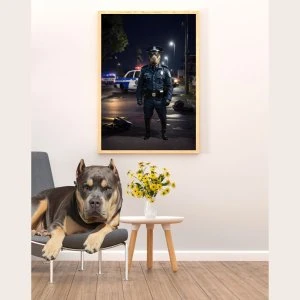Black Pitbull
What is a Black Pitbull?
A black pit bull is a type of dog that is a member of the pit bull breed group, which includes breeds such as the American Pit Bull Terrier, the Staffordshire Bull Terrier, and the American Bulldog. The pit bull breed group is known for its strong and athletic build, loyalty, and affection towards its owners.
The black pit bull is a variation of the pit bull breed with a black coat. The breed standard for pit bulls does not specify coat color, so black pit bulls are considered just as acceptable as any other coat color within the breed. However, some people associate black pitbulls with a more intimidating appearance, which can contribute to negative stereotypes about the breed. It is important to remember that a dog’s behavior is determined by its training and socialization, not its breed or coat color.
Are Black Pitbulls Rare?
The color black is one of pit bulls’ most common coat colors. Many pit bulls have black coats, which is not considered a rare or unusual coat color for the breed. While some other coat colors, such as blue or merle, may be considered a rarity for pit bulls, black coat color is not.
It’s worth noting that the American Kennel Club (AKC) does not recognize the American Pit Bull Terriers as a breed; thus, there is no official breed standard for pit bulls. However, the United Kennel Club (UKC) and the American Dog Breeders Association (ADBA) recognize the American Pit Bull Terrier as a breed. They do not specify a certain coat color for the breed. Therefore, black pit bulls are considered just as acceptable as any other coat color within the breed.
It’s also worth noting that the rarity of a certain color or pattern of a dog does not affect its value as a companion; the most important thing is how well the dog is trained, socialized, and loved.
Are Black Pitbulls More Aggressive?
There is no scientific evidence to suggest that pitbull black or any other coat color of pit bulls are more aggressive than other dogs. Various factors, including genetics, socialization, and training, determine a dog’s behavior.
Research has shown that most dogs, regardless of breed, are not aggressive. Like all other breeds, pit bulls can make loyal dogs when properly trained and socialized. In fact, pit bulls have been known to be affectionate, loving, and good with children.
Pit bulls have been unfairly stigmatized as an aggressive breed, which is harmful to the dogs and the people who own and care for them. This stigma is likely from misinformation, lack of knowledge, and irresponsible ownership, which can lead to animal cruelty and neglect.
It is important to remember that each dog is an individual and should be judged based on its behavior, not on its breed or coat color.
How Big Does A Black Pitbull Get?
The Black American PitBull Terrier, one of the dog breeds that fall under the pitbull group, is a medium-sized dog breed that typically weighs between 30 and 60 pounds and stands 17 to 21 inches tall at the shoulder.
However, it’s important to note that size can vary within the breed because there is no official breed standard for pit bulls. Some pit bulls may be larger or smaller than the average size for the breed. Additionally, the size of a pit bull can also be influenced by factors such as genetics, diet, and exercise.
It’s also worth noting that, like any other breed, there can be variations in size and weight within the breed. A healthy diet and regular exercise can help ensure that a pit bull reaches its full potential size.
It’s important to remember that a dog’s size should not be the only factor considered when selecting a breed. Other important factors to consider include the dog’s temperament, energy level, and suitability for your lifestyle and living situation.
Black Pitbull Health
Like all pitbull breeds, Black Pitbulls are generally healthy and sturdy dogs. However, like all breeds, they are prone to certain health conditions. Some common health issues seen in muscular black Pitbulls include:
Hip dysplasia:
This genetic condition affects the hip joint, causing it to develop improperly. This can lead to arthritis and lameness as the dog gets older.
Elbow dysplasia:
Similar to hip dysplasia, this is a genetic condition that affects the elbow joint. It can cause lameness and arthritis as the dog gets older.
Allergies:
Pitbulls can be prone to skin allergies, which can cause itching, redness, and hair loss.
Bloat:
This is a serious condition when the stomach fills with gas, fluid, or food. It can be fatal if not treated immediately.
Heart disease:
Some black Pitbulls may be predisposed to certain types of heart disease, such as dilated cardiomyopathy.
It’s also important to note that Pitbulls are prone to being overweight, leading to health issues such as diabetes, joint pain, and decreased mobility. Therefore, it’s important to maintain a healthy diet and exercise regimen for your black American pitbull.
Regular veterinary check-ups and screenings can help detect and prevent these health issues. Keeping up with your dog’s vaccinations and parasite prevention is also important.
Food and Diet Needs
Like any other dog, an all-black pitbull requires a balanced and nutritious diet that meets its specific needs. Pitbulls are a medium-sized breed known for being energetic and active so they will require more calories than a sedentary dog.
The best diet for a pitbull is high in protein and moderate in fat. This will help to maintain their lean muscle mass and support their active lifestyle. Good protein sources for Pitbulls include lean meats such as chicken, turkey, and fish, as well as eggs and dairy products.
It is also important to include a variety of vegetables and fruits in a pitbull’s diet. These can provide important nutrients such as vitamins, minerals, and antioxidants. Some good options include carrots, green beans, apples, and blueberries.
Pitbulls may also benefit from adding supplements to their diet, such as fish oil or glucosamine, to help support healthy joints.
It is important to note that Pitbulls can be prone to certain health issues, such as hip dysplasia and obesity, so it is important to monitor their weight and adjust their diet accordingly. It is also important to always consult with a veterinarian to determine your dog’s specific needs.
Exercise Requirements
Like any other pitbull, the exercise requirements for all black Pitbulls are fairly high due to their active and energetic nature. A good rule of thumb is to provide at least 30 minutes to an hour of vigorous daily exercise. This can include running, playing fetch, or agility training. Pitbulls also enjoy activities such as weight pulling and tracking.
It’s also important to provide Pitbulls with plenty of mental stimulation through activities such as puzzle toys or training exercises. This will help to keep them from becoming bored, which can lead to destructive behavior.
It’s also important to note that Pitbulls are known for having a strong prey drive, so it’s important to keep them on a leash or in a securely fenced area when they are outside. This can prevent them from chasing after small animals and getting into danger. Consult with your vet to determine the specific exercise needs of your dog.
Training Black Pitbulls

It is important to start training a muscular black pitbull at a young age, as they will be more receptive to learning new commands and behaviors. Basic commands such as sit, stay, come, and heel should be taught first. Socialization is also important, as Pitbulls can be prone to aggression if they are not exposed to different people, animals, and environments from a young age.
Obedience training is also important for Pitbulls, as it helps to establish clear boundaries and rules for the dog to follow. This can also help to prevent behavioral problems from developing later on.
Pitbulls are also highly active and energetic dogs, so providing them with plenty of physical exercises is important. This can include running, playing fetch, or agility training.
However, pit bulls have a strong prey drive and are known for being good at catching and holding on to things. This can make them well-suited for weight pulling, tracking, or protection work.
Grooming
The grooming needs of a black pitbull are similar to those of other breeds. They will need regular brushing to remove loose hair and prevent the matting of their coat. Pitbulls have a short, smooth coat that does not require much maintenance. A slicker brush or a hound glove can remove loose hair and keep their coat shiny. They also benefit from occasional baths to remove dirt and debris from their coat. It is important to use a gentle, dog-specific shampoo and to rinse thoroughly to avoid any irritation to their skin.
Trimming their nails is also important, as overgrown nails can cause discomfort and pain. Regular teeth brushing is also necessary to maintain good oral health. It is essential to check their ears regularly and clean them as needed to prevent infections.
Regular grooming is important to keep your pitbull looking and feeling its best. It is also a great opportunity to bond with your pet and check for any unusual lumps or bumps that might need to be checked by a vet.
Why Is There Negativity About the All Black Pitbull?

Another reason for the negativity is that black Pitbulls are often associated with the negative stereotypes surrounding the breed. Some people may view black Pitbulls as more aggressive or intimidating than other colored pit bulls, which can lead to them being unfairly targeted.
It’s also important to note that black pit bulls are often overrepresented in shelters and rescue organizations, leading to them being perceived as less desirable.
Each dog is an individual and should be judged based on its actions and behavior, not color. Pitbulls can make loving, loyal, and friendly pets when well-trained and well-socialized, regardless of their coat color.
Black Pitbull Puppies
A black pitbull puppy is a cute and energetic addition to any household. Like any other breed, providing them with proper care, training, and socialization is important.
Here are a few things to keep in mind when raising a black pitbull puppy:
- Diet: Feed your puppy a high-quality, age-appropriate diet that provides all the necessary nutrients for growth and development. It’s important to provide them with a balanced diet that consists of protein, carbohydrates, fats, vitamins, and minerals.
- Training: Start training your black pitbull puppy as soon as you bring them home. Basic commands such as sit, stay, come, and heel should be taught first. Positive reinforcement methods, such as rewarding good behavior with treats or praise, are the most effective way to train your puppy black pitbull.
- Socialization: Socializing your black pitbull puppy is crucial to prevent behavioral issues from developing later. Expose them to different people, animals, and environments from a young age.
- Exercise: Pitbulls are highly active and energetic dogs, so it’s important to provide them with plenty of physical exercises. This can include running, playing fetch, or agility training.
- Health: Keep a close eye on your black pitbull puppy’s health and schedule regular check-ups with your veterinarian. Keep them up-to-date on their vaccinations, deworming, and flea and tick prevention.
- Love and Attention: Pitbulls are known for being loyal and affectionate dogs, so make sure to provide your black pitbull puppy with plenty of love and attention. They need to be a part of the family and should not be left alone for extended periods.
Raising a black pitbull puppy can be a challenging but rewarding experience. It’s important to be patient and consistent and always keep your puppy’s best interests in mind.
How Much Does a Black Pitbull Cost?

Adoption is another way to get a black pit bull and can be a much more affordable option. Adopting a black pit bull from a shelter or rescue organization can range from $50 to $500, depending on the organization and the dog’s needs.
It’s worth noting that buying a dog from a breeder is only sometimes the best option, as it may contribute to the overpopulation of dogs in shelters. Adopting a dog from a shelter or rescue organization saves a life and helps make room for more animals in need of homes.
Keep in mind that owning a dog costs beyond the initial purchase price; you will also need to budget for food, veterinary care, grooming, and other ongoing expenses.
Black Pitbull Breeders
When looking for a black pitbull breeder, it is important to research and finds a reputable breeder committed to breeding healthy, well-tempered dogs. A reputable breeder can provide information about the dog’s health, temperament, and pedigree and will be willing to answer any questions.
Here are a few things to consider when looking for a black pitbull breeder:
- Look for a breeder member of a breed club or organization, such as the United Kennel Club (UKC) or the American Kennel Club (AKC). These organizations have strict breeding standards that breeders must adhere to.
- Visit the breeder’s facility and meet the dogs. A reputable breeder will happily show you around their kennel and introduce you to the dogs. Look for clean and well-maintained facilities, and make sure the dogs look healthy and well-cared for.
- Ask to see health clearances for the dogs. A reputable breeder will have health clearances for the dogs’ hips, elbows, and eyes to ensure they are free from genetic disorders.
- Ask about the breeder’s breeding practices. A reputable breeder will only breed dogs that are healthy and have good temperaments and will be able to provide you with information about the breeding dogs’ pedigrees and health clearances.
- Ask about the breeder’s return policy. A reputable breeder will be willing to take the dog back if things don’t work out and will give a guarantee of the dog’s health.
However, a reputable breeder will be more expensive than a backyard breeder or a puppy mill, but the investment will be worth it in the long run as you’ll be getting a healthy and well-tempered dog.
Final Thoughts
In conclusion, black Pitbull dogs are a strong and healthy breed, with a smooth and shiny coat that requires minimal grooming. They are known for their loyalty and affection towards their owners. Pups from particular types of dogs such as the American Pitbull Terrier and American Staffordshire Terrier are generally either totally black or black with white spots.
However, like all breeds, they are prone to certain health conditions such as hip dysplasia, elbow dysplasia, allergies, bloat, and heart disease. Maintaining a healthy diet and exercise regimen and regular veterinary check-ups and screenings are important to detect and prevent these health issues. Choosing a reputable breeder who does genetic testing and health clearances for the parents is also important.
Overall, with proper care and attention, an all-black pitbull can make a loving and devoted companion for many years. Educating yourself about the breed is important as a responsible owner and being prepared to provide them with the care and attention they need.
Our website is all about Pitbulls. If you’re a Pitbull lover and looking for more information about Pitbull colors, you’re in the right place. Learn more about the Blue Brindle Pitbull, Grey Pitbull, Black Pitbull, Brown Pitbull, Black & White Pitbull, Panther Black Pitbull, Tri-Color Pitbull, Tri-Color Bully and many others. We frequently update this page. Please bookmark it and check back soon!

Mandy has lived with pitbulls her whole life, and she has amassed a wealth of experience and knowledge about these magnificent animals. Having had the pleasure of owning and caring for numerous pitbulls over the years, she has come to understand their unique characteristics, behaviors, and needs. Read more

































































